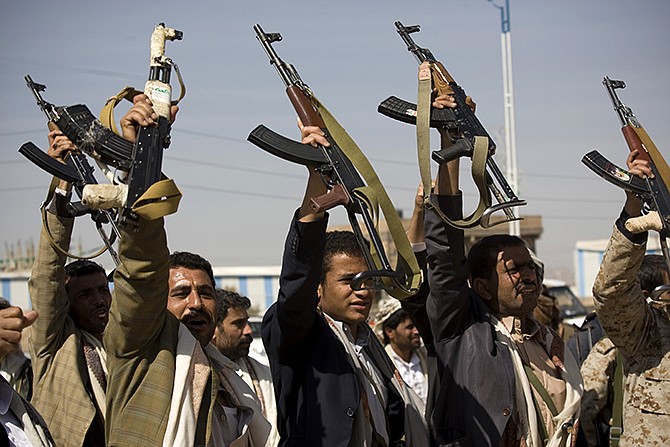SANAA, Yemen (AP) - Yemen's U.S.-backed leadership came under serious threat Monday as government troops clashed with Shiite rebels near the presidential palace and a key military base in what one official called "a step toward a coup."
The militants seized control of state media in fierce fighting that marked the biggest challenge yet to President Abed Rabbo Mansour Hadi by the rebels, known as Houthis, who swept down from their northern strongholds last year and captured the capital in September.
The violence threatened to undermine efforts by the U.S. and its allies to battle al-Qaida's Yemeni affiliate, which claimed responsibility for the attack on a Paris satirical magazine this month and which Washington has long viewed as the global network's most dangerous branch.
The Houthis and forces loyal to Hadi have been in a tense standoff for months and the two sides traded blame for the outbreak of violence Monday. Witnesses said heavy machine gun fire could be heard as artillery shells struck around the presidential palace. Civilians in the area fled as columns of black smoke rose over the palace and sirens wailed throughout the city.
Hadi, whose government has ceded control over nearly the entire capital, doesn't live at the palace, and extra soldiers and tanks deployed around his private residence, which is nearby.
As fighting escalated Monday, the convoys of Yemen's prime minister and a top official affiliated with the Houthis came under fire, and rebel fighters took over Yemen state television and its official SABA news agency, Information Minister Nadia Sakkaf said.
"This is a step toward a coup and it is targeting the state's legitimacy," Sakkaf told the Associated Press.
Cease-fire negotiations continued throughout the day by a presidential committee that included the interior and defense ministers, a presidential aide and a tribal sheik close to the Houthis. By the end of the day, a tenuous truce appeared to be holding.
The announcement of a cease-fire came after witnesses said the rebels had seized control of strategic hills that overlook both the palace and the military camp south of it. There was no government confirmation of the loss of territory.
At least nine people were killed in the fighting and 67 were injured, Yemen's deputy health minister, Nasser Baoum, told the AP.
Yemen's Western and international allies, including the U.S and Saudi Arabia, called for steps to implement and consolidate the cease-fire, expressing their support for Hadi.
"We reject the use of violence by those who seek to overturn Yemen's political transition for their own interests, and fully support President Hadi as the legitimately-mandated president," a statement on the U.S. Embassy website said.
The Houthis blamed Hadi for the escalation in hostilities, saying he reneged on a U.N.-sponsored agreement with the group in September that promised better representation on a committee to oversee the drafting of a new constitution. According to the agreement, Hadi was to appoint new members within 15 days to the 85-member national committee.
Hisham Al-Omeisy, a Yemeni activist who lives near the presidential palace, said the fighting began just after 6 a.m., with a shell hitting a hill controlled by the Houthis. The militants responded with heavy artillery fire, he said.
Al-Omeisy said he saw two bodies in civilian clothes just outside his house, but couldn't tell if the dead were civilians or Houthis, who do not wear uniforms.
"Later, I thought it was all quiet and I left my house. But a shell landed right near me," he told the AP.
Khaled al-Radhi, a 35-year-old military contractor who also lives nearby, said after hours of intense shelling, the Houthis seized control of a strategic hill that overlooks both the palace and a key military installation. "The group took control of the area," al-Radhi said.
The Houthis are seen by their critics as a proxy of Shiite Iran and are believed to be allied with former President Ali Abdullah Saleh, who ruled the country for more than three decades before he was ousted in 2012 after Arab Spring protests. While the militants deny any Iran link, their slogan, "Death to Israel, Death to America!" is a variation of a popular Iranian slogan often chanted by Shiite militants in Iraq.
The latest spasm of violence appears to be linked to the Houthis' rejection of a draft constitution that would divide the country into six federal regions. On Saturday, the rebel militiamen kidnapped one of Hadi's top aides, Ahmed bin Mubarak, to disrupt a meeting on the charter. The U.S., Saudi Arabia and other backers of the Yemeni leadership have called for his immediate release.
In a statement Monday, a Houthi spokesman, Mohammed Abdel-Salam, said the charter should only state that Yemen will be a federal state without specifying the number of regions. "Let the wise men of this people agree later on the regions and how to form them and their details," he said.

